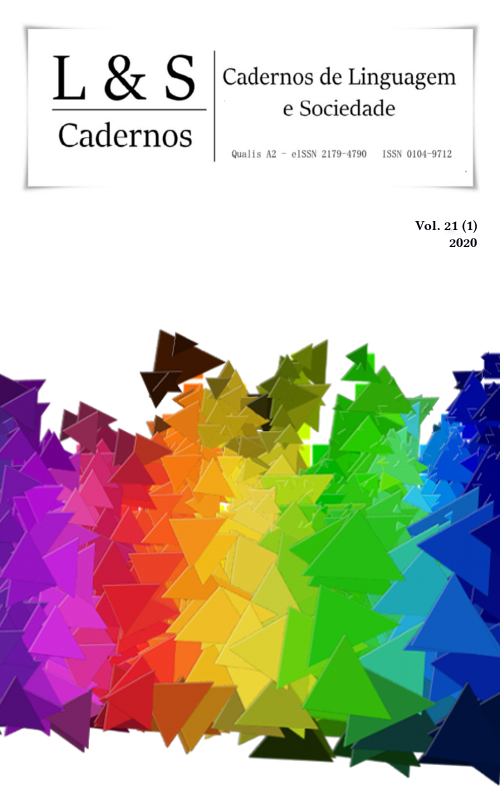DECONSTRUCTING THE COLONIALITY OF THE WEST-CENTRIC DEMOCRATIC IMAGINARY
DOI :
https://doi.org/10.26512/les.v21i1.30389Mots-clés :
CDA, Neoliberalism, Discourse of democratization, Neocolonialism, Ukraine, Norman Fairclough, Ernesto LaclauRésumé
Many CDA scholars present the idea of “democracy” as a normative yardstick against which injustices of all kinds and in any type of society can be measured; many also assume there is an inherent opposition between democratization with its advances toward social justice and neoliberal marketization with its array of negative consequences. Analyzing the discourse of democratization in the context of contemporary Ukraine, this paper argues that the issue is more complicated. Neoliberal marketization can go hand-in-hand with the discourse of universal democratization, which only contributes therefore to the perpetuation of neocolonial injustice as manifested in ongoing neoliberal projects.
Téléchargements
Références
ASCIONE, G. Decolonizing the ‘global’: the coloniality of method and the problem of the unit of analysis. Cultural sociology, v. 10, n. 3, p. 1-18, 2016.
BAYSHA, O. The mythologies of capitalism and the end of the Soviet project. Lanham, MD: Lexington, 2014.
BAYSHA, O. In the name of national security: articulating ethno-political struggles as terrorism. Journal of multicultural discourses, v. 14, n. 4, p. 332-48, 2017.
BAYSHA, O. Miscommunicating social change: lessons from Russia and Ukraine. Lanham, MD: Lexington, 2018a.
BAYSHA, O. Synecdoche that kills: how Barack Obama and Vladimir Putin constructed different Ukraines for different ends. International Communication Gazette, v. 80, n. 3, p. 230-49, 2018b.
BOYD-BARRETT, J. O. Western mainstream media and the Ukraine crisis: a study in conflict propaganda. London: Routledge, 2017.
BRUCE, I. Resisting neoliberalism through political and social critique: the Guardian column of Polly Toynbee. Discourse, Context & Media, v. 10, p. 45-52, 2015
DEAN, J. Democracy and other neoliberal fantasies. Durham & London: Duke University Press, 2009.
DECLARATION. Joint declaration of the Eastern Partnership Summit. Council of the European Union, 29 November, 2013. Available at: https://www.consilium.europa.eu/media/31799/2013_eap-11-28-joint-declaration.pdf. Accessed on: 29 May, 2020.
DERRIDA, J. Who’s afraid of philosophy: right to philosophy. Stanford, CA: Stanford University Press, 2002.
FAIRCLOUGH, N. Discourse and social change. Cambridge: Polity Press, 1992.
FAIRCLOUGH, N. Media discourse. London, New York: Edward Arnold, 1995.
FAIRCLOUGH, N. Analyzing discourse: textual analysis for social research. New York: Routledge, 2003.
FAIRCLOUGH, N. Language and globalization. New York: Routledge, 2006.
FAIRCLOUGH, N. Critical discourse analysis: the critical study of language. New York: Routledge, 2013.
FAIRCLOUGH, N. A dialectical-relational approach to critical-discourse analysis in social research. In: WODAK, R.; MEYER, M. (org.). Methods of critical discourse studies. London: SAGE, 2015a.
FAIRCLOUGH, N. Language and power. New York: Routledge, 2015b.
GARNHAM, N. The media and the public sphere. In: CALHOUN, C. (org.). Habermas and the public sphere. Cambridge, MA: MIT Press, 1992.
GUARDINO, M. Neoliberal populism as hegemony: a historical-ideological analysis of US economic policy discourse. Critical Discourse Studies, v. 15, n. 5, p. 444-62, 2018.
GÜVEN, F. Decolonizing democracy: intersections of philosophy and postcolonial theory. Lanham, MD: Lexington, 2015.
HABERMAS, J. The postnational constellation: political essays. Cambridge, MA: MIT Press, 2001.
JÄGER, S.; MAIER, F. Analysing discourses and dispositives: a foucauldian approach to theory and methodology. In: WODAK, R.; MEYER, M. (eds.). Methods of critical discourse studies London: SAGE, 2015.
JUSKA, A.; WOOLFSON, C. The moral discourses of ‘post-crisis’ neoliberalism: a case study of Lithuania’s Labour Code reform. Critical Discourse Studies, v. 14, n. 2, p. 132-49, 2017.
LACLAU, E. On populist reason. New York: Verso, 2005.
LACLAU, E. The rhetorical foundations of society. New York: Verso, 2014.
MCCARTHY, T. Race, empire, and the idea of human development. Cambridge, MA: Cambridge University Press, 2010.
PHILIPS, L.; JØRGENSEN, M. Discourse analysis as theory and method. London: SAGE, 2002.
POWER, M. et al., Reasonable people vs. the sinister fringe: Interrogating the framing of Ireland's water charge protestors through the media politics of dissent. Critical Discourse Studies, v. 13, n. 3, p. 261-77, 2016.
RUTHERFORD, J. The third place: interview with Homi Bhabha. In: RUTHERFORD, J. (ed.). Identity, community, culture, difference. London: Lawrence & Wishart. 1990.
SAKWA, R. Frontline Ukraine: crisis in borderlands. London; New York: I. B. Tauris, 2015.
SNYDER, T. The road to unfreedom: Russia, Europe, America. New York: Tim Duggan Books, 2018.
QUIJANO, A. Coloniality of power and Eurocentrism in Latin America. International sociology, v. 15, n. 2, p. 215-32, 2000.
SAID, E. W. Orientalism. NY: Pantheon Books, 1979.
STEGER, M. Globalism: Market ideology meets terrorism. Lanham: Rowman and Littlefield, 2005.
STIGLITZ, J. E. Globalization and its discontents. New York; London: W.W. Norton & Company, 2003.
TAYLOR, C. Sources of the self: the making of the modern identity. Cambridge, MA: Harvard University Press, 1992.
VAN DIJK, T. A. Critical discourse studies: a sociocognitive approach. In: WODAK, R.; MEYER, M. (ed.). Methods of critical discourse studies. London: SAGE, 2015. p. 62-85.
WODAK, R.; MEYER, M. Critical discourse studies: history, agenda, theory and methodology. In WODAK, R.; MEYER, M. (ed.) Methods of critical discourse studies. London: SAGE, 2015., p. 1-22.
YURCHENKO, Y. Ukraine and the empire of capital: From marketization to armed conflict. London: Pluto Press, 2018.
Téléchargements
Publié-e
Comment citer
Numéro
Rubrique
Licence
(c) Tous droits réservés Cadernos de Linguagem e Sociedade do Programa de Pós-Graduação em Linguística da UnB é licenciado sob uma Licença Creative Commons Atribuição-Uso não-comercial-Vedada a criação de obras derivadas 3.0 Unported. 2020

Cette œuvre est sous licence Creative Commons Attribution 4.0 International.
Autores/as que publicam nesta revista concordam com os seguintes termos:
Autores/as mantêm os direitos autorais e concedem à revista o direito de primeira publicação, sendo o trabalho simultaneamente licenciado sob a https://creativecommons.org/licenses/by-nc-nd/4.0/o que permite o compartilhamento do trabalho com reconhecimento da autoria do trabalho e publicação inicial nesta revista.



